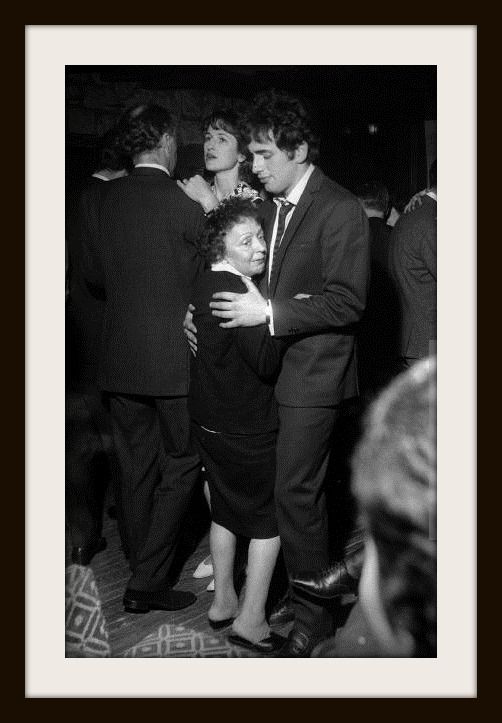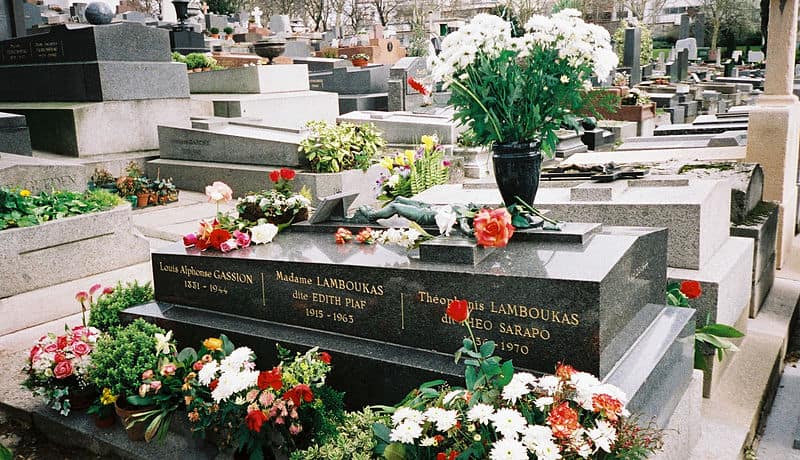

If you must look back, do so forgivingly.
If you must look forward, do so prayerfully.
However, the wisest thing you can do
is to be present in the present... Gratefully.
(Maya Angelou)
*****
NOT a subject I'm happy to consider, but that feeling/attitude itself is worth exploring I suppose, perhaps in a character-building or face-it sort of way...
One of my first thoughts was for Edith Piaf's iconic song, Je ne regrette rien, which has been with me for a long time:
Edith Piaf (neé Édith Giovanna Gassion) may not be a household commodity out your way, but her life is often cited as one of the Grand Tragedies, and this song seems to sum it all up as she looks back and considers the Question. And in her real life she may be the Gold Standard for the regrettable.
So here we deal with "The Little Sparrow" (in French, "La Môme Piaf", 'the Waif Sparrow'), a 4'8" street singer with tremolo to burn, first discovered in the early 1930s, and a staple of Paris cabaret for 30 years, until her death (at 47, of liver...) in 1963 ... and along the way, considered a traitor and collaborator for cozying up to the Nazi occupiers during WW II; with questionable taste in men; and pretty much continually in crisis of one kind or another, including alcohol and morphine addiction; and more than 100,000 people turned up at Père Lachaise for her burial. So, despite her protestations to the contrary, plenty that was regrettable. Widely considered one of the 20th century's greatest singers. Or at least most distinctive: you'll never mistake Piaf for anybody else. See more of the Story.


The song Je ne regrette rien has a surprising backstory and some rather uncomfortable associations with the French right wing and miserable colonial past.
when Dumont and Vaucaire visited Piaf's home at Boulevard Lannes in Paris on 24 October 1960, she received them in a very impolite and unfriendly manner. Dumont had several times tried to offer Piaf his compositions, but she disliked them and had refused them — the standard was too low, according to her. On that day she was furious that her housekeeper Danielle had arranged a meeting with the two men without informing her. So she let them wait an hour in her living room before she appeared. "As you can see I am extremely tired", she said to them, very irritated. "Hurry up, only one song! Quick to the piano, go ahead!" she commanded. Nervous and perspiring, Dumont sang the song in a low voice. When he finished there was a big silence, as they waited for Piaf's verdict. "Will you sing it again?" asked Piaf in a sharp voice. When he was hardly halfway through, she interrupted him. "Formidable! [Fantastic!]" she exclaimed. "Formidable. This is the song I have been waiting for. It will be my biggest success! I want it for my coming performance at L'Olympia!" Vaucaire, delighted, replied, "Of course, Édith, the song is yours".Piaf dedicated her recording of the song to the French Foreign Legion. At the time of the recording, France was engaged in a military conflict, the Algerian War (1954—1962), and the 1st Foreign Parachute Regiment — which backed the failed 1961 putsch against president Charles de Gaulle and the civilian leadership of Algeria — adopted the song when their resistance was broken. The leadership of the Regiment was arrested and tried but the non-commissioned officers, corporals and Legionnaires were assigned to other Foreign Legion formations. They left the barracks singing the song, which has now become part of the French Foreign Legion heritage and is sung when they are on parade.
(Wikipedia)
Before Je ne regrette rien, her most famous (and still 'signature') work was La Vie en Rose :
Eyes that lower mine
Des yeux qui font baisser les miens
A laugh that gets lost on his mouth
Un rire qui se perd sur sa bouche
Here is the portrait without retouching
Voilà le portrait sans retouches
From the man I belong to
De l'homme auquel j'appartiens
When he takes me in his arms
Quand il me prend dans ses bras
He whispers to me
Il me parle tout bas
I see life in pink
Je vois la vie en rose
He tells me love words
Il me dit des mots d'amour
Everyday words
Des mots de tous les jours
And it does something to me
Et ça me fait quelque chose
He has entered in my heart
Il est entré dans mon cœur
A slice of happiness
Une part de bonheur
That I know the reason
Dont je connais la cause
It's him for me, me for him in life
C'est lui pour moi, moi pour lui dans la vie
He told me, swore it for life
Il me l'a dit, l'a juré pour la vie
And as soon as I see him
Et dès que je l'aperçois
So I feel inside me
Alors je sens en moi
My heart beating
Mon œur qui bat
Nights of endless love
Des nuits d'amour à plus finir
A great happiness that takes its place
Un grand bonheur qui prend sa place
Troubles, sorrows fade away
Des ennuis, des chagrins s'effacent
Happy, happy to die
Heureux, heureux à en mourir
When he takes me in his arms
Quand il me prend dans ses bras
He whispers to me
Il me parle tout bas
I see life in pink
Je vois la vie en rose
He tells me love words
Il me dit des mots d'amour
Everyday words
Des mots de tous les jours
And it does something to me
Et ça me fait quelque chose
He has entered in my heart
Il est entré dans mon cœur
A slice of happiness
Une part de bonheur
That I know the reason
Dont je connais la cause
It's you for me, me for you in life
C'est toi pour moi, moi pour toi dans la vie
He told me, swore it for life
Il me l'a dit, l'a juré pour la vie
And as soon as I see you
Et dès que je t'aperçois
So I feel in me
Alors je sens dans moi
My heart beating
Mon cœur qui bat
La la, la la, la la
La la, la la, la la
La la, la la, ah la
La la, la la, ah la
La la la la
La la la la